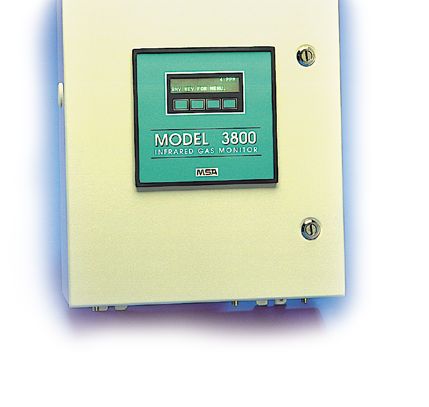|
Your employees are your most valuable resource. Why monitor the air they
breathe with gas detection instruments that might not do enough inaccurate
readings?
MSA's highly sensitive Model 3800 gas monitors offer cutting-edge infrared
photoacoustic technology to detect more than 75 gases used in plastics,
petrochemical, and other industrial and manufacturing processes.
The low-cost, wall-mounted monitors can detect gases, including
hydrocarbons, solvents, alcohols, alkanes, and toxics, as low as 0.01 ppm (part
per million parts of air) in some applications.
"Each monitor shoots a pulse of infrared light into a pressurized
testing chamber, where, if a targeted gas is present, the light reacts with it
and forces its molecules to vibrate," said product line manager Ron
Campbell of MSA's permanent instruments division.
The sound waves vibrate against an internal microphone. The vibrations are
proportionate to the amount of gas present — registering an easily
interpreted reading on the front panel. Samples can be taken from as far as 150
feet away and in seven-second intervals for trend analysis.
"You can calibrate it to any gas you want, as long as it's an infrared
active gas," Campbell said. "It's fairly flexible."
The 3800 monitors come in three different enclosure styles for installation
in explosion-proof, NEMA 4, or rack-mounted configurations.
A proprietary sensing technique automatically determines whether water
vapors have infiltrated gas samples and subtracts them from test readings. The
monitors can operate for months with virtually no zero drift, which means, if
no gas is present, you'll get a true zero reading each time.
A Multipoint Sequencer option allows the easily installed 3800 monitors to
be expanded to monitor up to eight locations.
MSA also offers the new wall-mounted UltimaŽ IR monitor that can detect
low levels of 25 combustible gases, including methane, propane, and butane. The
Ultima IR's catalytic sensor is extremely stable and easy to use. "It's
basically a turn-on-and-walk-away type monitor," Campbell said.
For more information about the Model 3800
or Ultima IR
monitors, call the Instrument Division's Sales Department at
1-800-MSA-INST.
|









